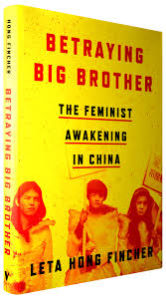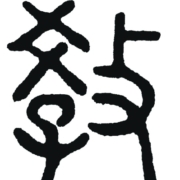 Today we explore the feminist movement in China. My guest is Leta Hong Fincher, an award-winning journalist and scholar.
Today we explore the feminist movement in China. My guest is Leta Hong Fincher, an award-winning journalist and scholar.
Leta argues that the jailing of the Feminist Five in 2015 was a turning point for the movement.
Leta Hong Fincher recently published the book, Betraying Big Brother: The Feminist Awakening in China, published by Verso (2018).
Citation: Fincher, Leta Hong, interview with Will Brehm, FreshEd, 132, podcast audio, October 29, 2018. https://www.freshedpodcast.com/fincher/
Transcript, translation, and resources:
Will Brehm 1:13
Leta Hong Fincher, welcome to FreshEd.
Leta Hong Fincher 1:15
Thank you so much for having me.
Will Brehm 1:17
So on March 6, 2015, Wei Tingting was arrested in her home in China. Can you describe what happened to Wei and why she was arrested?
Leta Hong Fincher 1:26
Sure. Well, it wasn’t just her. I mean there was actually a really sweeping round of arrests carried out by Chinese authorities in quite a few different cities at the same time. And they arrested a number of feminist activists – anywhere from ten to a whole lot more than ten, actually. And then they ended up focusing on five young women; Wei Tingting was one of the five. Some of the other women were in other cities, but they brought all of the women to Beijing and put them in the same detention center. These women had been planning to celebrate International Women’s Day by handing out anti-sexual harassment stickers on subways and buses. But they didn’t even get to carry out their activity because the round of arrests was carried out just a couple of days before International Women’s Day.
Will Brehm 2:27
And how did the Chinese state authorities even know that there was some sort of protest being planned?
Leta Hong Fincher 2:32
Well, I mean, the Chinese authorities monitor social media very closely, not just social media, but there’s very heavy internet censorship in general. The popular group messaging app, WeChat, it is used pretty much by everybody – or at least every young person in China almost – to communicate, and that app is very closely monitored by the authorities, particularly if you have been involved in any kind of activist – even if you haven’t been protesting, but if you’re just a person of interest. A lot of people are very closely monitored by the Chinese government, and that’s how they found out.
Will Brehm 3:24
And when these women were all brought to Beijing, what sort of interrogation did they undertake with these feminists?
Leta Hong Fincher 3:31
Well, I write in quite a lot of detail about the experiences in detention of the five young women who ended up being known as the Feminist Five, and I don’t think I want to go into too great detail, but I do want to highlight some things. Four of the five women who were jailed wore glasses, and the first thing that the security agents did with these women when they were detained was to confiscate their glasses, which was extremely disorienting. And Wei Tingting, whom you mentioned at first, was the woman who had the worst eyesight. I mean, without her glasses, she could not see anything actually. And so she had a very vivid description; she actually wrote about it online and she posted description of how she felt when she was first detained, and she called it Prison Notes. And then of course, her essay was later deleted by censors.
But she describes having her glasses confiscated and it was in the middle of the winter. So it was freezing. There was no heat, and the agents also confiscated her snow boots and her coat. So it was a form of severe mistreatment for sure. And so she describes becoming just overwhelmed by a feeling of powerlessness and terror. And then she started to hear some sounds in the cell. She was at first put in a very small cell by herself. But then when she heard the sounds, she couldn’t see anything. But she put her ear up against the wall of the cell. And she started to make out the voices of some other young women who had collaborated with her before on some feminist activities. And so she recognized the voices of some of the women, and then she began calling out and then actually began singing to them, and then at least one of the other women sang back to her as well. And so in Wei Tingting’s description of what happened, listening and hearing the voices of these other women that she knew who had been detained with her, lifted her spirits and so she knew she was not alone. That buoyed her spirits, and then she described feeling defiant again, that she was determined to fight and resist whatever it was that was going to come next during her detention. And she describes this feeling of overcoming her powerlessness and recovering her sense of defiance as the joy of betraying Big Brother.
Will Brehm 6:42
And how long was she detained?
Leta Hong Fincher 6:44
All of the women were in this formal detention center for 37 days. It looked like the women were on track to being criminally prosecuted for a form of disturbing the social order. But when the women were jailed, there was a huge global outcry to their arrest and jailing and so this was something that the Chinese authorities really did not count on at all. They thought in jailing, these women, these five young women, that they were just picking some of the women who were involved in the Women’s Rights movement, which was very, very small at that time, and they thought that by jailing some of these women that they would be able to wipe out the prospect of a large scale feminist movement and nip the problem in the bud. But in fact, the opposite happened because so many people were angered and galvanized into action by the jailing of these women inside China. The feminist community was really galvanized and a lot of other people, even outside the feminist community, were really angered and then outside China, there was a massive outcry. There was a lot of diplomatic pressure, there were people staging protests in other cities. So all of that pressure ended up leading to the release of these women after 37 days, which is pretty unprecedented in China. But the level of outcry was also quite unprecedented.
Will Brehm 8:23
And what was the context before they got arrested in 2015? Was there anything in particular that these women were responding to? And that the government wanted to, you know, nip it in the bud so quickly. I mean, you said that the feminist movement in China was quite nascent at that time. So can you explain some of the context in which this was all happening in China?
Leta Hong Fincher 8:44
Sure. Well, I mean, this is why I believe that the jailing of the Feminist Five was such an important turning point for women’s rights, because up until that time, the government had been very tolerant of these young women’s activities. First of all, it wasn’t a large number of women. There were maybe 100 or more women who regularly were staging acts of what they called “performance art” to draw attention to various issues related to women’s rights. For example, in 2012, three of the young women wore these white wedding gowns that were splashed with faux red paint. And it was a protest against domestic violence. In another action, in the city of Guangzhou in the South, a group of these feminists occupied the men’s public toilet and told men to vacate the stalls and allow women to use the stalls for a while just to highlight the fact that there aren’t enough public toilets for women. So these are just a couple of examples of the kinds of actions or performance art that these feminist activists were taking part in. Isolated actions that attracted some attention, but not really a huge amount of attention.
And in fact, even with the Occupy Men’s Toilets action in Guangzhou, the Chinese state media, including Xinhua News, which is really the mouthpiece of the Chinese government – they reported on it, so it wasn’t considered a politically sensitive issue at the time in 2012. And the Chinese government officially has, I mean, since the founding of the People’s Republic has stated that gender equality is one of its core principles. So everything that the feminist activists had been doing was in line with official Chinese government support for gender equality. So that’s why it was so shocking to everybody – people around the world as well as in China, who knew about it, because there was basically a blackout on the news in China that those who knew about it were so shocked that these five young women were jailed, merely for planning to celebrate International Women’s Day and call attention to something that the Chinese government itself says it’s opposed to sexual harassment.
Will Brehm 11:32
It’s so interesting that these women were basically continuing what they’ve been doing for years in terms of various protests, various performance art pieces, and as you said, being connected to this gender equality as a core principle of the Chinese government historically. And yet in 2015, things take a very different turn. So I mean, what happened in 2015 that resulted in these women being arrested and jailed and detained?
Leta Hong Fincher 11:59
Well, nobody’s ever going to know for sure exactly what the calculus, what was going through the minds of these Chinese government officials in the security apparatus. But it was clear that in the years leading up to the arrest of the Feminist Five that these young feminists were becoming more politically organized and attracting more supporters. And so they were also located in different parts of China and communicating with each other, and organizing actions across geographical boundaries. So anytime you have that kind of cross-locality political organizing, that alone no matter what it is you’re doing, is going to be viewed, if it becomes more than just a one time thing, it’s going to be viewed as some kind of threat to the Communist Party. So on the one hand, these feminist activists were becoming more politically organized; they were located in different parts of the country; they were becoming more popular. You know, at this point, I think it’s too much to speculate on exactly why they were arrested at the time. But the fact is that so many people are arrested and jailed in China.
What is so unusual is that there was an enormous global outcry to the jailing of these women and following the release of these women, that is when I believe the political movement, the women’s rights movement, really began to grow. Even though there was a period of extreme difficulty when the women were jailed and there was a there was a severe crackdown on feminist activism that really began with the jailing of these women. Several months later, the women themselves – the five women who had been jailed- I describe in detail what they went through in detention, and then when they were released, even when they were released, they were under de facto house arrest. And they were sent back to their parents’ homes, or in one case, one of the women was married with a child and she was sent back to her husband and her child. And so the authorities have always used or especially recently – perceived troublemakers, family members like their parents or their husbands to try to keep the troublemakers in line and warn them not to do anything. So several months later, after the Feminist Five were released, the authorities finally began to loosen their monitoring of these five women in particular. And that’s when I started interviewing all of them. And then when I did my interviews, I realized that actually this feminist network is much bigger, much more complicated and broader than I had ever realized.
Will Brehm 15:16
And I think this is such an interesting idea that these protest movements sort of find solidarity around the world and support and through that global network can actually sort of push the hand of the Chinese government to release these women from detention after 37 days, which you said earlier was pretty unusual.
Leta Hong Fincher 15:35
Yes. I mean, I certainly don’t believe that the women would have been released were not for this incredible global reaction. And it was also the timing of the jailing of the women that was very, very bad. It made the Chinese government looks so hypocritical because it happened just a few months before Chinese President Xi Jinping was supposed to host or co-host a women’s conference, a World Women’s Conference at the United Nations in New York. And so the conference was supposed to or did, mark the 20th anniversary of the Beijing World Conference on Women in 1995. And it was at that conference in 1995 that Hillary Clinton who was then First Lady gave her extremely famous speech declaring that women’s rights are human rights. And when these five women were in detention, Hillary Clinton also tweeted about them. And when she tweeted, she tweeted her outrage at the persecution of these young women. And when she tweeted that, she was considered to be the front runner for the US president. So I think that were it not for that, and it wasn’t just her – there were quite a few other heads of state or representatives of other governments who were speaking out.
Will Brehm 17:07
And what’s interesting is, you know, talking about Twitter and the power that had in 2015, today we see this MeToo hashtag that has sort of gone global, starting in, I think it was about October of 2017 or so. So is there sort of a #MeToo movement happening in China today?
Leta Hong Fincher 17:30
Oh, absolutely. I mean, it’s been really incredible for me to see #MeToo take off in China, because China is such a hostile environment for any kind of social movement organizing, and certainly for a hashtag campaign because of the incredibly draconian and sophisticated internet censorship. So #MeToo itself is primarily – well in its current iteration – is really something that went viral on the internet. But I thought initially, “Oh, this will not be able to take off in China because there are too many obstacles.” There’s the incredibly heavy internet censorship. So in fact, the MeToo hashtag itself went through many different waves of censorship. Sometimes, you know, a lot harsher, sometimes it was looser, and then there was a feminist activist who came up with a way to get around the censorship for a while by using the emojis for the Chinese equivalent of MeToo is “mi tu”, which sounds just like MeToo, but it means rice and bunny rabbit, and so this young activist came up with the idea of using emojis for a rice ball and a bunny rabbit, and for a while that was able to get around the censors. Then there were other ways; these activists are constantly coming up with imaginative ways to get around the censorship.
So that’s one very serious obstacle. But then in addition to that, you also have no press freedom, which is another incredibly, you know, major obstacle because it was the in-depth reporting by the news media in the United States that kind of broke open this case against a famous Hollywood producer, Harvey Weinstein. And that’s what got… I mean, the MeToo hashtag even though it had been founded years earlier, by an African American civil rights activists, Toronto Burke, but it didn’t go totally viral until after these news organizations did in-depth investigations. And then all these famous Hollywood actresses came out, went public about their experiences with sexual abuse, and then that kind of marked the point at which it started going viral globally. So you don’t have press freedom in China, you don’t have internet freedom either, you don’t have freedom of assembly, and you also don’t have an independent judiciary. So victims of sexual violence have basically no recourse. And yet in spite of all these incredible obstacles, #MeToo really has taken off in China, and it’s still going, you continue to see very brave young women coming forward with accusations of sexual assault or sexual harassment. And they are just undaunted by the sometimes extremely severe retaliation that they face.
Will Brehm 20:53
And in China, has there been any men who have lost their power, have had to step down, like the equivalent of Harvey Weinstein?
Leta Hong Fincher 21:02
Well, I mean, Harvey Weinstein is an unusually powerful player in Hollywood. But there have been quite a few men in China who have lost their jobs as a result of accusations of sexual violence of some kind. Perhaps the highest profile case is a famous Buddhist abbott, who was accused by some nuns of sexual abuse, and he was very senior. He was forced to resign. But then there are so many other cases as well there. There have been university professors who have lost their jobs after accusations, sometimes by quite a lot of women, their students saying that their professors had sexually abused them. It’s also gone… #MeToo kind of started in China on university campuses or involving university students, or recent graduates. But then it spread beyond universities to include sectors like the NGO sector as well, the tech sector. There’s been a very famous state television host, who is accused by his intern of sexual abuse. And now he’s actually suing the intern for some kind of defamation. But she’s undaunted, and she’s still going ahead, a very brave young woman. And so it’s just incredible. It’s incredible for me to see the bravery of these young women.
Will Brehm 23:00
It is. It’s absolutely amazing to see that despite such high hurdles, in a sense, in so many different realms, women continue to come forward and get their voices heard. And I want to actually ask a little bit about Xi Jinping, the president of China. You call him a paternalistic patriarch in the book, and I wanted to know why do you call him that? And in what ways does he present this uber-masculine image of himself in discourse throughout China?
Leta Hong Fincher 23:30
Yes. Well, I argue that patriarchal authoritarianism has been a pillar of Communist Party rule in China. And there are so many ways in which sexism and misogyny and the subjugation of women in general underlie authoritarian rule by the Communist Party. And so Xi Jinping is the latest manifestation of that kind of patriarchal authoritarianism. But it’s been going on for a long time; it preceded his ascendancy. But it’s under Xi Jinping, it has become even more intense and obvious. And that coincides with a real resurgence of extreme authoritarianism inside the country under his rule. So for example, just a few months ago, China abolished presidential term limits, so Xi Jinping could certainly be China’s ruler for the rest of his life. But a lot of people have written about the personality cult surrounding Xi Jinping, which is quite reminiscent of the Mao Tse-tung era, and Mao, of course, was the founder of the People’s Republic of China in 1949, and then he led China until he died in 1976. So we haven’t seen this kind of personality cult, really since those the Mao days. But the thing is, it’s not just a personality cult, it is a hyper-masculine personality cult. And if you look at the ways in which President Xi is presented as somebody who’s very manly, he possesses the qualities of, or he’s portrayed as being the ideal father of the nation, a very strong man, a strong ruler, ruling over this collection of male-dominated families.
And so I write a lot about how the patriarchal family is critical as well to maintaining. Communist Party sees family harmony in the patriarchal family, where the woman knows her place; where the woman is a dutiful wife and mother, and the man is the head of the family, the patriarch who is to be obeyed, and then ruling above everybody. And in fact, the Communist Party has been using this notion; they use the term “family-state under heaven”. And they refer to, you know, there’s a new resurgence of propaganda about so-called “family values” where women have to play their proper role as being subservient to men in the family. And it’s kind of complicated, but that’s the essence is that women have to return to the home, they have to play the dutiful wife and mother, be baby breeders in the home, rear their children, take care of the elderly. And if women do this and behave, then that’s going to contribute to the country’s political stability, it’s going to bolster Communist Party legitimacy, so it will enable the Communist Party to rule over this massive country for much longer than the Soviet communist party ever did.
Will Brehm 27:38
So it’s interesting that there seems to be this state discourse that is patriarchal, uber-masculine, very clear gender roles and responsibilities and social life. And yet at the same time, there’s this sort of growing, in a sense, #MeToo movement in China that started from, not necessarily started, but was maybe the turning point was when these Feminist Five and more were arrested in 2015. And so these these seem to be very competing discourses and in tension with one another. And I just wonder what do you think the future is going to look like? How are these competing discourses going to play out?
Leta Hong Fincher 28:17
Yeah, I don’t even see them as being competing discourses so much as an absolute clash. It is the confrontation that in fact it’s the Communist Party’s assault on women’s rights and a newly aggressive assault on women’s rights that has resulted in such a strong women’s rights movement. Because young women are pushing back, they’re really resisting and they don’t want to be pushed into marrying early, they don’t want to be pushed into having babies before they’re ready. A lot of young women are rebelling, more and more young women are rebelling against these very traditional roles of wife and mother. And this is viewed by the Communist Party to be a real threat to China’s future. Because if you look at the demographic situation in China – what the Communist Party sees as a huge crisis of falling birth rates, and the aging of the population, and the shrinking of the workforce. All of these demographic changes are happening at the same time as the the severe slowing of Chinese economic growth. So over the last few decades, particularly since 1989, when a massive pro-democracy uprising was crushed by the Tiananmen massacre. Since that time, the Communist Party – well several years after that in 1992 – is when China unleashed these massive market reforms to jumpstart economic reforms and to really move away from the planned economy of the past and towards free market and capitalist reforms, and thereby allowing the population to just begin raising their living standards. And so the Chinese population was effectively co-opted by these really successful, in many cases, successful economic reforms, this breakneck economic growth, that led to double-digit economic growth rates for so many years. But that period is now over. And so the Communist Party’s political legitimacy is in serious danger. And so one of the solutions identified by the male-dominated Communist Party is to get young women, particularly educated Han Chinese women who are seen as very, you know, that’s the kind of population that the Chinese government values. They want these young women to marry and have babies, but the young women, by and large, just don’t want to do that anymore. And they’re increasingly angry and upset about this pressure. And so #MeToo is one manifestation of what I call this broader feminist awakening that’s happening in China. But this confrontation between the Chinese government, trying to force young women into these roles that are very traditional, and young women increasingly refusing to play those roles and increasingly demanding change and standing up for women’s rights, that confrontation is going to continue. And it’s fascinating to watch. It’s also somewhat worrying, but it’s also exciting at the same time. It’s exciting and inspiring to see so many young women in China who are daring to stand up to the world’s most powerful authoritarian regime and say, “No”.
Will Brehm 32:19
Well, Leta Hong Fincher, thank you so much for joining FreshEd. It really was a pleasure to talk to you.
Leta Hong Fincher 32:23
It was a pleasure to be here. Thank you so much for inviting me.
Want to help translate this show? Please contact info@freshedpodcast.com
Betraying Big Brother: The Feminist Awakening in China










